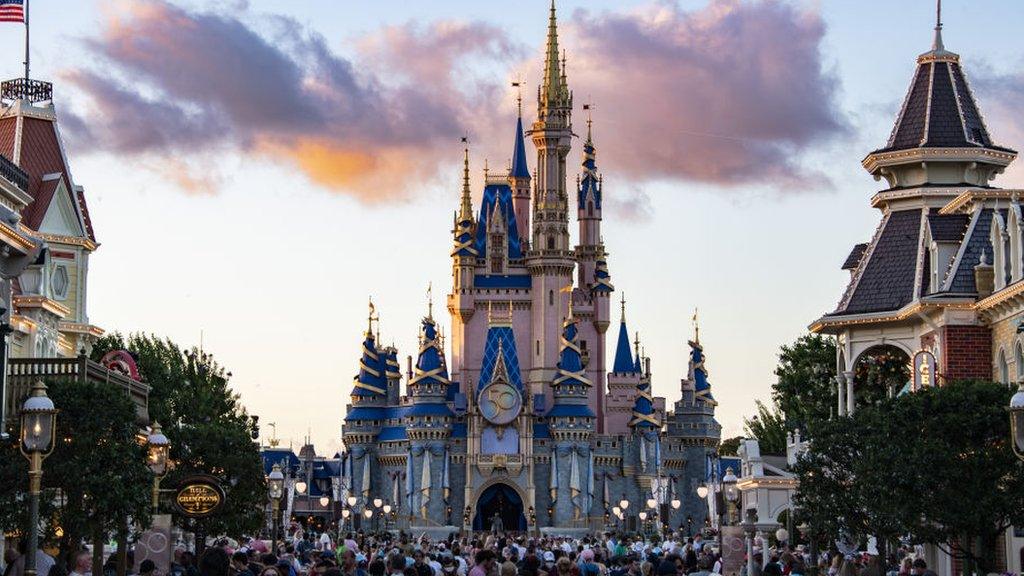Ron DeSantis thinks his feud with Disney will pay off. Here's why
- Published
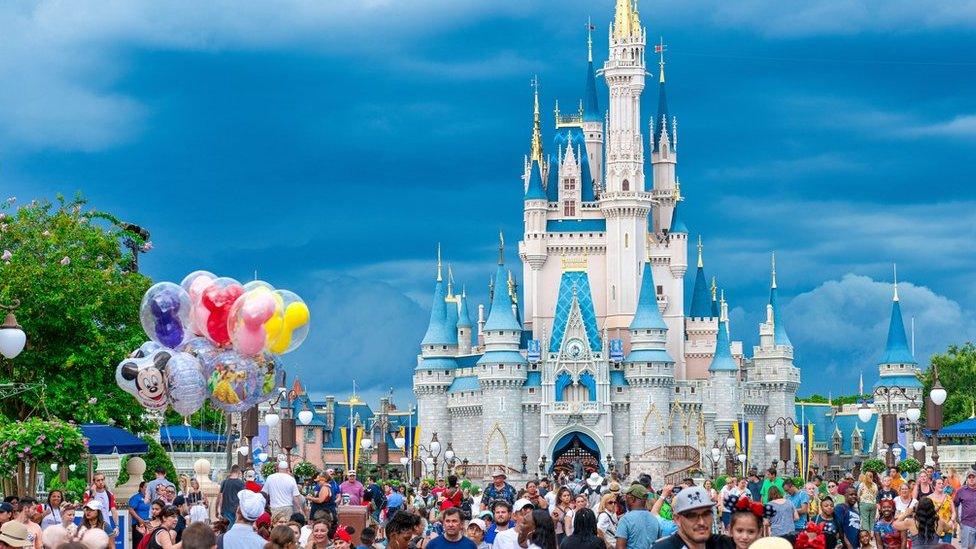
Ron DeSantis is refusing to back down from a fight with Disney over how issues of sexuality and gender identity are taught in schools. It's a high-stakes gamble the governor is making about what Republican voters - and ultimately the American public - want from their next president.
Steve Schussler sits in the front seat of a car bobbing in the middle of Lake Buena Vista and surveys his Disney Springs empire.
While discussions over the political strategy - and wisdom - behind Mr DeSantis's fight with the Walt Disney Company touch on larger, theoretical debates about the direction of the Republican Party, for a businessman like Mr Schussler the feud has very real consequences.
To the left is the Rainforest Cafe, a jungle-themed restaurant chain he founded in 1994 and sold in 2000. His prehistoric-themed T-Rex cafe is in the distance, where once an hour the interior comes to life with animatronic dinosaurs, roaring and screeching in a primordial din.
All of Disney Springs is owned by the Disney Company, and Mr DeSantis' attempt to wrest oversight of the land from Disney - with accompanying hints of new regulations, taxes, toll roads and even prison construction nearby - has prompted Mr Schussler to speak out against what he says are the governor's strong-arm, anti-business tactics.
"We as business owners feel disgusted and betrayed by the governor's proposed taxes and rhetoric," he says, adding that his only political goal is to have "peace, quiet, harmony and not to be attacked".
Watch: DeSantis v Disney fight explained in 90 seconds
Mr Schussler is the kind of businessman who might naturally be a Republican - in favour of small, less intrusive government, reasonable taxes and limited regulation. He's once donated money to a Republican senator's campaign and features a quote from Donald Trump on the back cover of his autobiography.
Now he bristles at allegations that he's siding with Disney as part of a woke liberal agenda.
"How is it a liberal agenda to not want to be overtaxed?" he asks. "To not want to be threatened with having a prison build adjacent to your land? How is it an agenda to not want your employees and guests to have to pay special fees?"
The DeSantis feud with Disney is about how cultural issues trump business concerns, however. It began when the corporation, under pressure from employees, criticised a Florida law that prohibits public school teachers from discussing sexuality and gender identity in the classroom - what critics have dubbed the "Don't Say Gay" bill.
In the latest escalation, Disney - which employs 80,000 people in Florida and is described as a kingdom within a state - has scrapped plans to build a new campus in central Florida which would have enticed 2,000 employees from California to work in digital technology.
As the Florida governor prepares to announce a bid for the 2024 Republican nomination, it is a conflict of his own choosing.
"Do they have a First Amendment right to be advocating for gender ideology in kindergarten? Yeah, I guess," Mr DeSantis says of Disney. "But what I can tell you as governor is that under no circumstances should the state of Florida be subsidising woke activism by allowing them to have their own government."
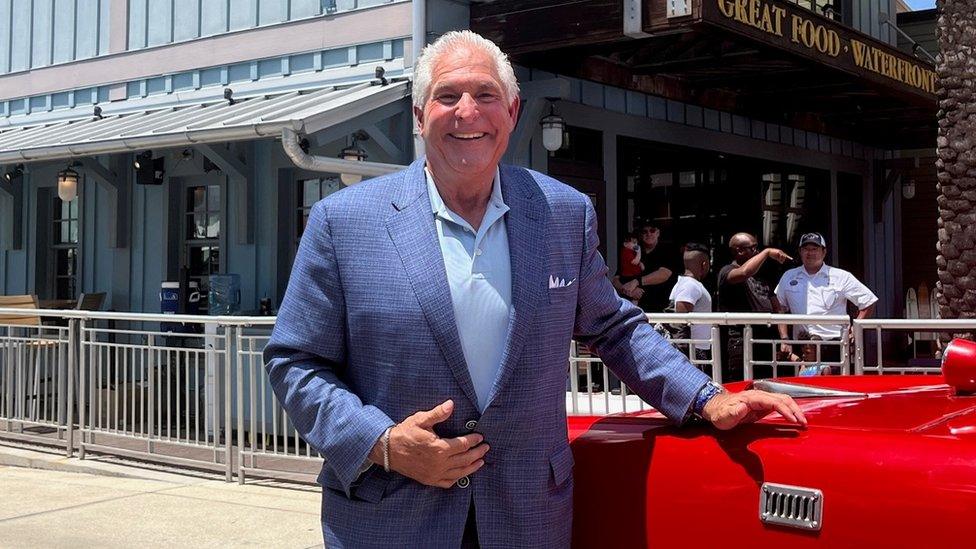
Steve Schussler - whose venues are a major tenant at Disney's entertainment district - says he's disgusted by Mr DeSantis' feud with the firm
And, according to Erin Huntley, who chairs the Republican Executive Committee for Orange County, Florida, which includes Orlando and Walt Disney World, it's a fight he can't - and shouldn't - back down from.
She frames the debate as one about parental rights and education, with Mr DeSantis on one side and Disney on the other.
"The bottom line is people want their kids to be educated in school," she says. "School is for reading, writing, history and science. And if the governor didn't hold the line on that, I think he wouldn't have been as successful in his re-election campaign."
Saying Mr DeSantis' re-election campaign was a success is an understatement. In a state where margins of victory have been measured in the low single digits, the Florida governor enjoyed a 19-point landslide last November.
The win vaulted Mr DeSantis into the top tier of potential Republican presidential candidates and set up a face-off against Donald Trump. To defeat the former president, however, he'll have to convince Republican voters that he's a superior choice to the man who has won the party's presidential nomination the last two times.
To do so, Mr DeSantis is betting that he is best positioned to woo a changing Republican Party - one with more populist sentiments, which views the elite establishment, including big multinational corporations like Disney, with increasing scepticism.
Watch: Five things to know about Ron DeSantis
Research conducted by Democracy Fund's Voter Study Group after the 2016 presidential election found that cultural, not economic, concerns were the key dividing line between Donald Trump and Hillary Clinton voters.
"The glue that has traditionally held the Republican Party together was the free-market, conservative economic side," says University of Central Florida politics professor Aubrey Jewett. "There now seems to be a significant number of Republicans who don't subscribe to that anymore."
If this is the case, the strategy behind Mr DeSantis's fight with Disney begins to come into focus. He's calculating that Republicans have shifted their opinions on business and the economy, and his policies toward Disney and other "woke" corporations reflect this.
Republicans appear to largely support Mr DeSantis's efforts. An April Ipsos poll of US public opinion found that 64% of Republicans believe Mr DeSantis is "rightfully rolling back special treatment for Disney", while 36% think he is punishing Disney for exercising free speech rights.
Among the wider public, however, the verdict is less rosy. Eighty-two percent of Democrats and 63% of Republicans are against political candidates who support laws that punish a company for political or cultural stances.
Randy Ross, a gay Republican who served as Donald Trump's Orange County campaign chair in 2016 and still supports the former president, thinks Mr DeSantis's Disney feud shows he is making a critical mistake by moving too far to the right on social issues.
"What you're really doing is turning Florida into this Bible-belted image of what you think the right wants," he says. "Ron DeSantis has created enemies among independents as well as the moderate Republicans."
And his unwillingness to settle the issue quietly, behind closed doors, reflects poorly on the governor's political judgement, he says. Instead, Mr DeSantis is being cheered on by some conservatives even as he alienates businessmen like Mr Shussler and voters in the political middle.
"I know Disney is not perfect, and they probably need to be reeled in here and there," he says. "But this public battle, to put a part of Florida's soul on trial, is a big mistake."
The town of Celebration, Florida, is carved within the boundaries of Disney-owned land south of Orlando. It's filled with idyllic homes with big front porches and tree-lined streets. The quaint central business district seem to harken back to a simpler American life, with ice-cream socials, potluck dinners, costumed Halloween parades and summertime music concerts.
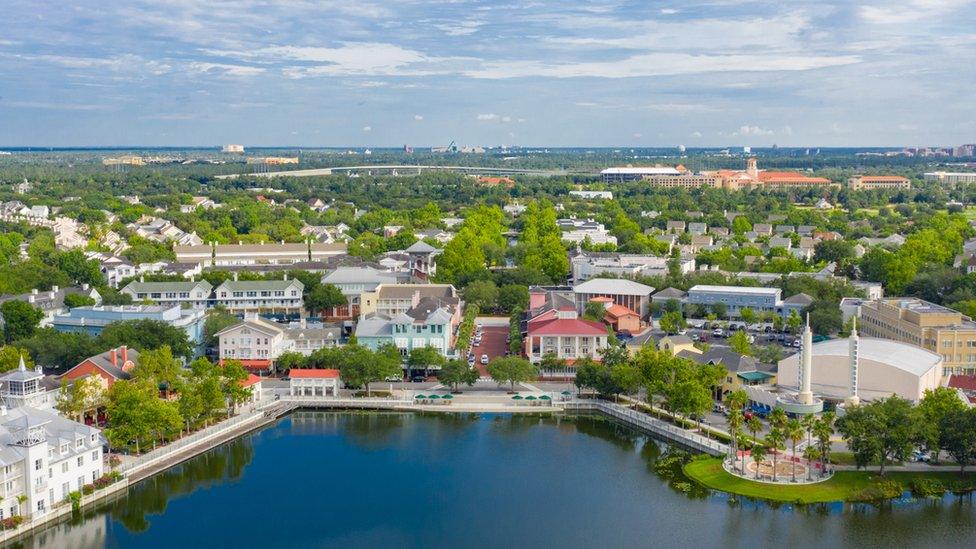
The quaint town of Celebration - to the immediate south of Walt Disney World - was built by the entertainment giant in the 1990s
All of this is by design, of course. Disney's design. The town was built by the corporation in the mid-1990s as an exercise in community planning - inspired by Walt Disney's vision of reimagined suburban life.
Running a theme park and running a town - with its services, schools and challenge of everyday life - are entirely different matters, however, and eventually Disney handed over management of Celebration to an equity company. There were lawsuits and acrimony. And while officially out of the picture, Disney still keeps a close eye on the town - and its reputation.
Cookie Kelly lives in Celebration, where she works as a real estate agent. Like many Orlando-area residents, she was once a Disney employee, serving as a costumed theme-park character - "in the fur", as she puts it. She's seen Disney's battles up close, and while she still loves the Disney magic, she also has a healthy respect for the company's power.
"They take no prisoners," she says.
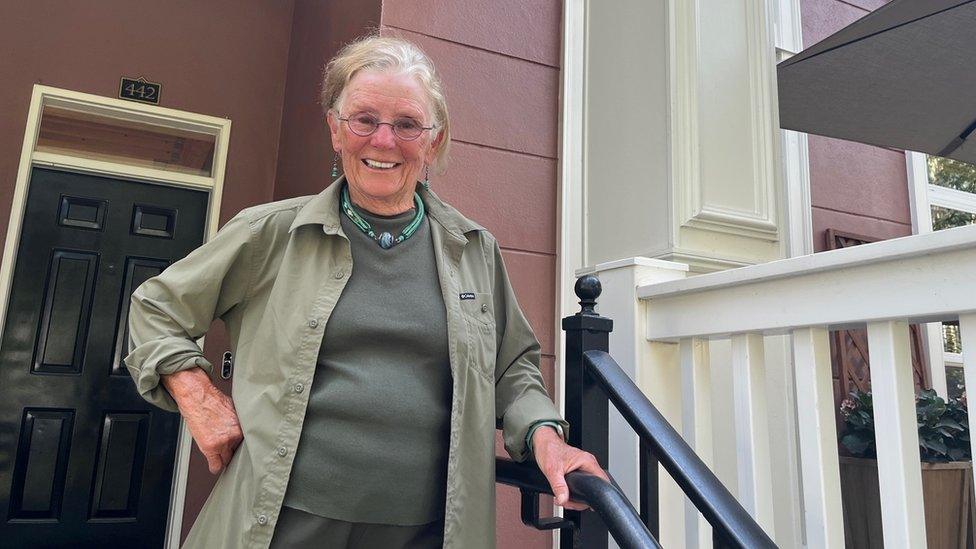
Realtor Cookie Kelly used to work in costume, or "in the fur" as she puts it, at Walt Disney World
As for politics, Celebration - like the rest of America - is closely divided. In 2020, 49.9% of residents voted for Joe Biden, while 49.4% backed Mr Trump.
According to Ms Kelly, Disney's current fight with Mr DeSantis is a regular topic of conversation around town, and views on the topic are decidedly mixed. Among her friends, however, the consensus is that Mr DeSantis is "nuts" for picking a fight with the company that turned central Florida from a patch of undeveloped swampland into an economic giant.
"A lot of people talk about it," Ms Kelly says of the feud. "Some think he's just crazy. But there are others that are very much in favour of his policy and are convinced that every child under fourth grade is being groomed for some horrible thing."
Mr DeSantis is counting on the latter voters being the ones that decide the Republican Party's presidential nomination. At that point, he will have to hope that it's not too late to change the minds of some of those in the first group, as he'll need their support to win the presidency itself.
Find out more

You can hear more of Anthony's analysis by tuning into Americast, the BBC's US politics and culture podcast, on BBC Sounds or wherever you get your podcasts
And you can follow Anthony on Twitter , external

- Published26 April 2023
- Published18 May 2023
